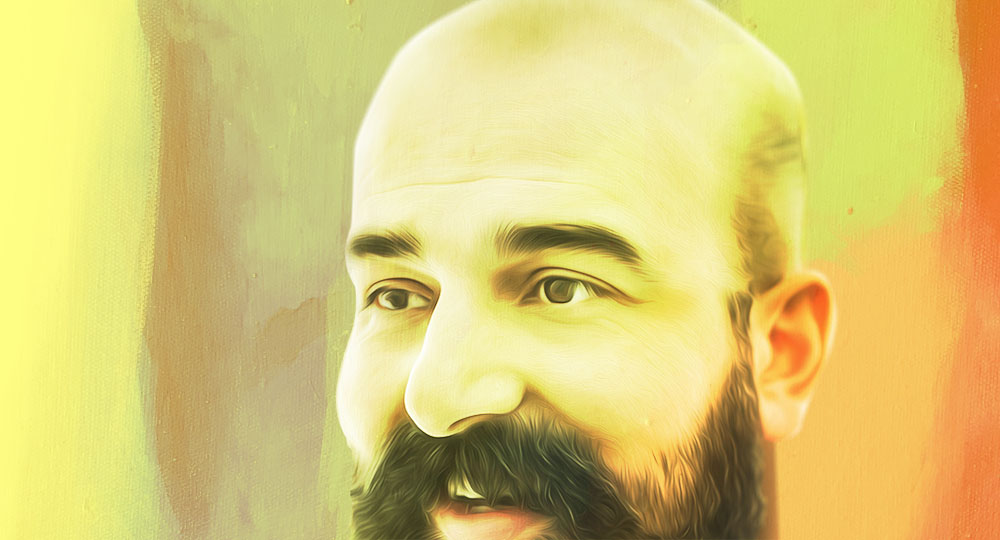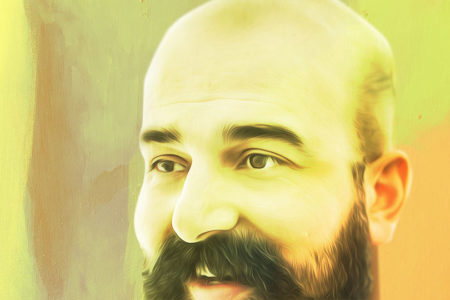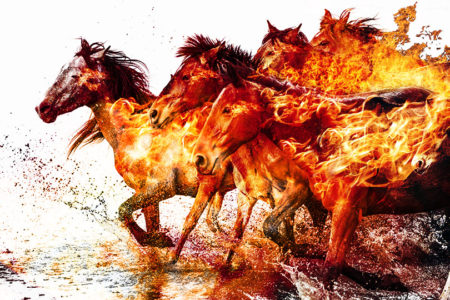Elisha: God’s Miracle Man
An overview of the prophet, his manner, and his ministry.
1 Kings 19:16—2 Kings 13:21
Elijah and Elisha were among Israel’s most important prophets. Some people confuse them, but they were extremely different men. Elisha first appeared in biblical history when God commanded Elijah to anoint him as a prophet (1 Ki. 19:16). Soon after, Elisha replaced Elijah as head of Israel’s prophetic order.
Whereas Elijah was a loner, Elisha was well received by all levels of Israelite society. Elijah was aloof and lived in the wilderness, wandering throughout the northern kingdom of Israel wearing the garment of a prophet. He often challenged idolatry and government corruption.
Elisha looked like a more typical Israelite. Though at odds with the dynasty of King Ahab and Queen Jezebel (2 Ki. 9:1–10), he was a trusted advisor during the reigns of four Israelite kings: Joram (849–842 BC), Jehu (842–815 BC), Jehoahaz (815–801 BC), and Joash (801–786 BC).
Elisha’s family appears to have been wealthy; and Elisha owned property in Samaria, the capital of the northern kingdom of Israel (6:32).
Although different from Elijah in many ways, Elisha still followed in the steps of Elijah’s ministry, performing twice as many miracles and meeting the needs of people in every level of society, from kings to the extremely poor and oppressed.
Elisha’s Call
Elisha’s name means “God (Eli) is salvation (sha).” The name fits his mission to call Israel to repentance and to turn it from the sin of idolatry to the worship of the God of Israel.
Elisha was the son of Shaphat from Abel Meholah of the tribe of Issachar. His ownership of 12 yokes of oxen indicates he was a wealthy farmer (1 Ki. 19:16–19).
Elijah found Elisha plowing a field with his oxen. The prophet simply walked by and cast his mantle over him. Realizing what Elijah had done, Elisha ran after the prophet, asking only that he be allowed to say goodbye to his parents before following him. Elisha then killed and roasted a yoke of oxen, using the wooden plows for fuel (vv. 19–21). His action symbolized his acceptance of God’s call on his life. Elisha refused to leave Elijah’s side and for many years functioned as his protégé until God took Elijah home to heaven.
Elisha must have spent time in what was called the school (or sons) of the prophets, in which Elijah was a major leader. School locations included Gilgal, Bethel, and Jericho. There, through training and guidance, spiritual gifts were transferred from one prophet to another. Elisha exemplifies the process.
Elisha’s Commission
One day, with 50 men from the school of the prophets looking on, Elijah struck the Jordan River with his mantle. The waters parted, and Elijah and Elisha walked across on dry ground. Then Elijah asked Elisha what he could do for him before God took him. Elisha replied, “Please let a double portion of your spirit be upon me” (2 Ki. 2:9).
Elisha’s request was granted the moment Elijah ascended to heaven. Elijah’s mantle fell to the ground. Elisha picked it up, walked to the Jordan, and struck the river with it. Immediately, the waters parted, as they had done for Elijah. The prophets witnessing the event recognized the transfer of power: “They said, ‘The spirit of Elijah rests on Elisha,’” confirming Elisha was to succeed Elijah (v. 15).
Elisha demonstrated great compassion for people’s needs. He traveled extensively, counseled kings, and befriended Israelites and foreigners alike. Under him, Baal worship disappeared from Israel (10:28).
His ministry was threefold: to show personal compassion by healing people via miracles, to provide political counseling to kings, and to prophesy of future events.
Elisha’s Career
In its nature, Elisha’s ministry resembled Elijah’s. Both men focused on ridding Israel of idolatry. A major difference was that Elisha performed twice as many miracles (28) as Elijah (14) over a much longer time. However, Elijah’s ministry manifested God’s wrathful vengeance against Israel’s idolatry, whereas Elisha’s showed God’s mercy and grace, both to Israel and to some of its enemies.
ZECHARIAH: ISRAEL’S PROPHETIC FUTURE AND THE COMING APOCALYPSE
Check out David Levy’s commentary on another prophet of God in Zechariah: Israel’s Prophetic Future and the Coming Apocalypse.
After bringing Elijah to heaven, God confirmed Elisha’s call by using Elisha to perform three miracles: (1) dividing the Jordan, as Elijah had done (2:14); (2) healing a polluted spring at Jericho by dumping a new bowl of salt into the water (vv. 19–22); and (3) cursing people, who then died.
This third miracle occurred as Elisha left Jericho for Bethel. En route, a group of youths taunted him, saying, “Go up, you baldhead!” (v. 23). Their disrespect voiced a hatred of God and His prophet. Elisha cursed them, whereupon two female bears emerged from the woods and mauled 42 of them (vv. 23–24).
These three miracles were a sign to Israel that Elisha’s ministry would mean life for those who honored God, but death for those who scorned Him. Elisha’s acceptance as God’s prophet in the place of Elijah spread quickly throughout Israel, and Israelites again had renewed hope for their nation’s spiritual healing.
Elisha proved faithful to his call, commission, and career throughout many years of ministry. Even though he never lived to see Israel’s total deliverance from its enemies, his ministry would be felt even into the first century AD.
Elisha is mentioned once in the New Testament. Jesus referred to him and his healing of Naaman the Gentile leper (Lk. 4:27). Many of the Lord Jesus’ miracles resembled those of Elijah and Elisha in their power, diversity, and outreach to both Jewish people and Gentiles, prefiguring God’s judgment and mercy and the grace of reconciliation.
Elisha played a major role in Israel’s spiritual life as a prophet and patriot. He impacted Israel politically, while providing for the personal needs of many Israelites. Consequently, he goes down in history as one of the greatest men in ancient Israel.









Muy hermosa enseñanza hermano David, nos da un cuadro general muy estimulante de la obra del profeta Eliseo.
Por otro lado el comentario del hermano con respecto al ascenso al cielo del profeta Elías, dice claramente “he aquí un carro de fuego con caballos de fuego apartó a los dos; y Elías subió al cielo en un torbellino”
Yo hace tiempo me preguntaba cómo se apareció al Señor Jesús en el monte de transfiguración Moisés y Elías para darle ánimo obtuve la respuesta de Eliseo en el versículo anterior Eliseo está ahí con un cuerpo glorificado y Dios lo envió para su amado.
De Moisés dice que su cuerpo lo peleaban los angeles de Dios y los demonios él no ascendió en cuerpo al cielo como Esos y Elías, pero Dios sabe cómo hacer todo para su gloria.
Desde Santiago de Chile un abrazo
Very beautiful teaching brother David, gives us a very stimulating overview of the work of the prophet Elisha.
On the other hand, the brother’s comment regarding the rise to heaven of the prophet Elijah, clearly says “behold, a chariot of fire with horses of fire separated the two; and Elijah ascended into heaven in a whirlwind. ”
I long ago wondered how Moses and Elijah appeared to the Lord Jesus on Mount of Transfiguration to give him encouragement. I got Elisha’s answer in the previous verse. Elisha is there with a glorified body and God sent him for his beloved.
Of Moses he says that his body was fought by the angels of God and the demons he did not ascend in body to heaven like Those and Elijah, but God knows how to do everything for his glory.
From Santiago de Chile a hug
I have enjoyed David’s interpretations/insight of scripture for 15 years. He explains scripture with scripture, never saying “no your wrong” causing me to do just that – read scripture and let the Spirit guide me. Thank you David. Christ is Risen!
I always enjoy the interpretations of David M. Levy, they are always so clear and biblically grounded
I fully enjoy David Levy’s articles. They are clear, easily understood in layman’s wording, so that anyone reading his writings can comprehend and get much information while getting an interesting, hold your attention style. I love Israel My Glory. Thank you most sincerely.
Thank you for your thoughts on both Elijah and Elisha. Both were men of God with distinct calling to which they were obedient. What’s so exciting is that the same God they served we have today whereby we too can worship and serve. Psalm 27:4, 6b, 8, 11, 14.
Beautiful – Elijah / elisha no easy task –
With great respect, I am all for Israel’s world leading status to come, through Messiah’s return. I consider myself a Bible student and have been for 45 yrs. Your reference to Elijah having gone to heaven is contradicted by Jn 3:13 where Jesus stated that NO ONE has ascended into heaven. This would also apply to Enoch, who was also translated to wherever. A man after God’s own heart, King David, is also not there. If he had an immortal soul, then where did he go? To me, 1 Cor 15:52-54
answers where the patriarchs are – in the ground awaiting the resurrection. The dead know not anything. Eccl 9:5. 1 Cor 15:54 states that this MORTAL must put on immortality. Did Lazarus go to heaven for 4 days, then come back to be awakened by Jesus? Hope this stimulates further thought
on the subject! Tony
Remember the word of the Lord. When Jesus Christ died, he went to the ones that longed for him and preached the gospel to them. “… By which also he went and preached unto the spirits in prison …” (1 Peter 3) He went down to the Old Testament saints that looked forward to the coming of the Messiah and did sacrifice in anticipation of his coming. When Christ went to heaven, he took the souls and spirits of them with him to heaven. “… Wherefore he saith, When he ascended up on high, he led captivity captive, and gave gifts unto men. (Now that he ascended, what is it but that he also descended first into the lower parts of the earth? He that descended is the same also that ascended up far above all heavens, that he might fill all things.) …” (Ephesians 4) Only the body of the Christian is in the grave. His/her spirit is in heaven. “.. absent from the body; present with the Lord ..” And, yes, one day, when Christ returns for his bride, the Christian receives a new body at the resurrection.